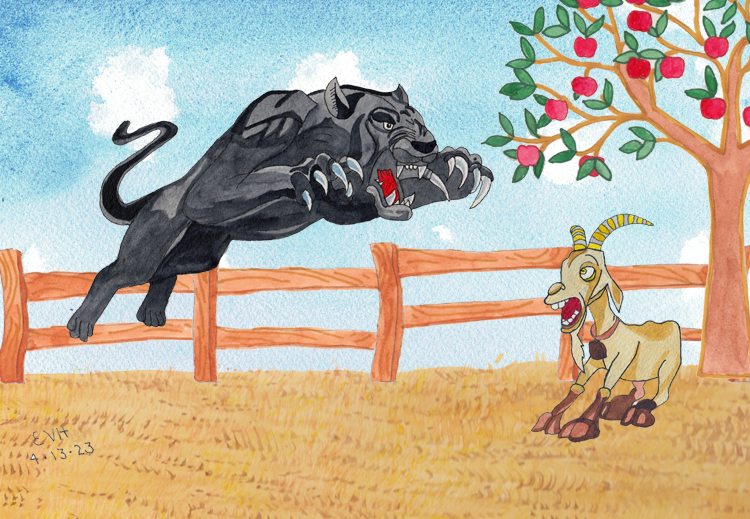
Jataka 426
Dīpi Jātaka
The Panther
as told by Eric Van Horn
originally translated by H.T. Francis and R.A. Neil, Cambridge University
originally edited by Professor Edward Byles Cowell, Cambridge University
There is this saying in Asia: “Love the tiger from afar.” This story is about how it is sometimes inevitable that we meet with evil beings with evil intentions. This is simply the reality of life.
In this story we see something a little unusual in the Jātaka literature, and that is a story about two animals who are reborn later as the same animals. However, in the case of the rebirth, the outcome is quite different!
“How fares it with you.” The Master told this story while he was living at Jetavana. It is about a certain female goat. At one time the Elder Moggallāna lived in a dwelling with one door. It was in a mountain valley that was surrounded by hills. His covered walk was near by the door. Some goatherds thought the enclosure would be a good place for their goats, so they drove them in and lived there at their pleasure. One day they came back in the evening, took all the goats, and then went away. But one female goat had wandered off, and not seeing the goats departing, she was left behind. Later, as she was leaving, a certain panther saw her. And thinking to eat her, he stood by the door of the enclosure. She looked all round and saw the panther. “He is here because he wants to kill and eat me,” she thought. “if I turn and run, my life is lost. I must play the man.”
And so she tossed her horns and sprang straight at him with all her might. She escaped his grip, even though he was quivering with the thought of catching her. Then running at full speed, she caught up with the other goats. The Elder observed how all of the animals had behaved. On the next day he went and told the Tathāgata what had happened. “So, lord, this female goat escaped by her readiness and so escaped from the panther.” The Master responded, “Moggallāna, the panther failed to catch her this time, but once before he killed her even though she cried out.” Then at Moggallāna's request, he told this story from the past.
Once upon a time the Bodhisatta was born in a certain village of the Magadha kingdom. He was born into a wealthy family. When he grew up, he renounced sensual desires and adopted the holy life. There he was able to attain the perfection of meditation.
After living for a long time in the Himālaya Mountains, he went to Rājagaha for salt and vinegar. He lived there in a hut of leaves which he made in a mountain enclosure. Just as in the introductory story, the goatherds drove their goats there, and in the same way, one day a single female goat went out later than the rest. A panther waited by the door, thinking to eat her. When she saw him, she thought, “My life is forfeit. In some way I must get him into pleasant and kindly talk and so soften his heart. In this way I can save my life.” So she began a friendly conversation with him from some distance. She spoke the first stanza:
How goes it with you, uncle, and is it well with you?
My mother sends her kind regards, and I’m your friend so true.
Hearing her, the panther thought, “This baggage would trick me by calling me ‘uncle.’ She does not know how tough I am.” And so he spoke the second stanza:
You’ve stepped upon my tail, miss goat, and done me injury,
And you think by saying “Uncle” that you can go scot-free.
When she heard him, she said, “O uncle, don’t talk in that way.” And she spoke the third stanza:
I faced you as I came, good sir, you face me as you sit,
Your tail is all behind you, how could I step on it?
He answered, “What do you say, she-goat? Is there any place where my tail might not be?” And so he spoke the fourth stanza:
As far as four great continents with seas and mountains spread,
My tail extends. How could you fail on such a tail to tread?
The female goat—when she heard this—thought, “This wicked one is not attracted by soft words. I will answer him as an enemy.” And so she spoke the fifth stanza:
Your villain’s tail is long, I know, for I had warning fair,
Parents and brothers told me so, but I flew through the air.
Then he said, “I know you came through the air. But as you came, you spoiled my food.” And so he spoke the sixth stanza:
The sight of you, miss goat, on high, the air a-flying through,
Frightened a herd of deer, and so my food was spoiled by you.
Hearing this, the goat could make no other excuse. In fear of death she cried out, “Uncle, do not commit such cruelty. Spare my life.” But even though she cried out, the panther seized her by the shoulder, killed her, and ate her.

Figure: The panther attacks

’Twas thus the she-goat cried for grace, but blood must satisfy
The beast that grips her throat, the bad will show no courtesy.
Conduct, nor right, nor courtesy, the bad man will display,
He hates the good, to face him then ’tis best in open fray
These are two stanzas inspired by Perfect Wisdom.

A holy recluse saw the whole matter of the two animals.
After this lesson, the Master identified the birth: “At that time the female goat and the panther were the female goat and the panther of today, and I was the holy recluse.”
